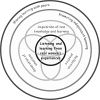Using video narratives of women's lived experience of breastfeeding in midwifery education: exploring its impact on midwives' attitudes to breastfeeding
- PMID: 22136222
- PMCID: PMC6860724
- DOI: 10.1111/j.1740-8709.2010.00258.x
Using video narratives of women's lived experience of breastfeeding in midwifery education: exploring its impact on midwives' attitudes to breastfeeding
Abstract
Strong evidence supports the health benefits of breastfeeding contributing to the public health campaign to improve initiation and duration of breastfeeding globally, yet breastfeeding continuation rates are persistently low in the UK. Inadequate support from health professionals appears to be an underlying feature, aggravated by a dearth of professional education that uses a biopsychosocial approach. This paper describes how using women's video narratives of their lived experience of breastfeeding within higher education impacted positively on the attitudes of a group of midwives in relation to supporting breastfeeding women. It reports on the qualitative element of a two-phase sequential mixed methods study where focus group methods generated rich data about how and why the educational intervention altered attitudes. Analysis was thematic. Six major themes emerged, 'listening and learning from real women's experiences'; 'generation of emotions'; 'acquisition of new knowledge and learning'; 'reflection on practice'; 'promotion of independent learning' and 'sharing learning and ideas with peers'. 'Listening and learning from real women's experiences' was central to learning, and was pivotal to attitudinal change, motivating an intense need to improve practice. Findings support the value of using women's video narratives within midwifery education, through their power to integrate affective and cognitive learning, and to promote a transformative learning process. This novel approach brings value-added learning benefits by enhancing the potential to improve attitudes towards supporting breastfeeding women and improving clinical practice.
© 2010 Blackwell Publishing Ltd.
Conflict of interest statement
The authors declare that they have no conflicts of interest.
Figures
References
-
- Abbott P. (2002) Implementing evidence‐informed nursing. Research awareness In: Evidence‐Informed Nursing. A Guide for Clinical Nurses (eds McSherry R., Simmons M. & Abbott P.), pp. 14–40. Routledge: London.
-
- Anderson T. & Davies L. (2004) Putting the ‘art’ into the art and science of midwifery. The Practising Midwife 7, 22–25. - PubMed
-
- Baxter J. (2006) Women's experience of infant feeding following birth by caesarean section. British Journal of Midwifery 14, 290–295.
-
- Becker G.E. (1992) Breastfeeding knowledge of hospital staff in rural maternity units in Ireland. Journal of Human Lactation 8, 137–142. - PubMed
-
- Bernaix L.W. (2000) Nurses' attitudes, subjectives norms, and behavioral intentions toward support of breastfeeding mothers. Journal of Human Lactation 16, 201–209. - PubMed


